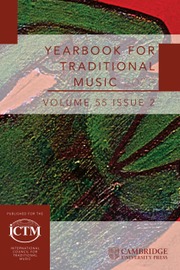Article contents
Anthropological and Psychological Approaches to the Study of Music Theory and Musical Cognition
Published online by Cambridge University Press: 07 March 2019
Extract
In the last decade some of the most significant research in ethnomusicology has resulted from anthropologically orientated inquiries into the nature of musical cognition. We have witnessed the development of a “cognitive ethnomusicology”; based on the exploration of emic notions about music. Some studies have been directed specifically to explore these cognitive representations, for example: Zemp (1979) on the panpipe ensembles of the ‘Are’ are; Feld (1981) on descriptions of melodic contour amongst the Kaluli of New Guinea, and Sakata (1983) on musical ethnosemantics amongst Persian speakers in Afghanistan. Others have tackled these issues as part of wider ranging studies, such as Blacking (1967:20-1) on the naming of pipes in the end-blown reed-pipe ensembles of the Venda, and Berliner (1978:2-7, 54-9) on the system of note names for the keys on the Shona mbira.
- Type
- Articles
- Information
- Copyright
- Copyright © 1988 by the International Council for Traditional Music
References
References Cited
- 8
- Cited by


